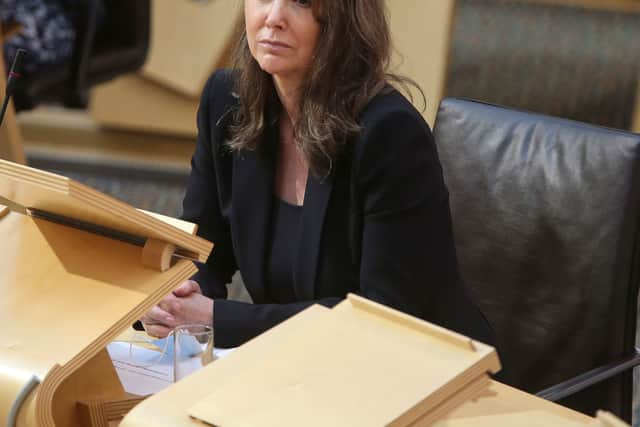Scottish independence referendum: Supreme Court Indyref2 ruling explained - when was announcement made
and live on Freeview channel 276
The UK’s Supreme Court has ruled that the Scottish Parliament does not have the power to hold a second independence referendum.
Ahead of the ruling, a Scottish government spokesperson said: “There is a substantial majority in the Scottish Parliament in favour of an independence referendum and therefore a clear democratic mandate. However, as the First Minister has set out, there remains debate over whether the Scottish Parliament has the powers to legislate to hold a referendum.
Advertisement
Hide AdAdvertisement
Hide Ad“The Lord Advocate’s reference of this question to the Supreme Court was intended to achieve legal clarity on this point. We are aware a judgement will be handed down by the court and ministers will respond shortly thereafter.”
This is what you need to know.
What did the Supreme Court rule?
The court has ruled that the Scottish Parliament does not have the power to hold a second independence referendum
The judgement said: “In a unanimous judgment, the Court answers the questions before it as follows.
“First, the question referred by the Advocate General is a devolution issue, which means that that the Court has jurisdiction to decide it. Secondly, the Court should accept the reference. Thirdly, the provision of the proposed Bill which makes provision for a referendum on the question, “Should Scotland be an independent country?” does relate to matters which have been reserved to the Parliament of the United Kingdom under the Scotland Act. In particular, it relates to the reserved matters of the Union of the Kingdoms of Scotland and England and the Parliament of the United Kingdom.
Advertisement
Hide AdAdvertisement
Hide Ad“Accordingly, in the absence of any modification of the definition of reserved matters (by an Order in Council or otherwise), the Scottish Parliament does not have the power to legislate for a referendum on Scottish independence.”
What time was the ruling?
A panel of five justices - Lord Reed, Lord Lloyd-Jones, Lord Sales, Lord Stephens and Lady Rose - delivered their verdict today, Wednesday 23 November. The judgement came after hearing arguments on behalf of both the UK and Scottish governments over the course of the month.
The Supreme Court judgement was announced live via the Supreme Court website at 9:45am.
What were the possible outcomes?
There were a number of outcomes that could have arisen as a result of the ruling from the Supreme Court.
Advertisement
Hide AdAdvertisement
Hide AdCourt says referendum is within legislative competence of Holyrood
The Scottish Government has said that, should a referendum be within the gift of the Scottish Parliament, a Bill will be introduced and likely passed given the deal between the SNP and Scottish Greens.
Barring any issues, a vote would be held on 19 October next year.
But, according to legal expert Dr Andrew Tickell, the UK Government and other opponents of separation would not be powerless to stop another vote.


Advertisement
Hide AdAdvertisement
Hide AdSpeaking to the PA news agency, he said: “Even if the Scottish Government win this and have the opportunity to pass a piece of legislation through Holyrood, this isn’t the end of the story.”
He added: “Are [the UK government] going to block it using their Commons majority? They could do that as a matter of law.”
Dr Tickell added that the possibility of a boycott by opposition parties to any referendum would “create a whole range of interesting implications”.
Scottish Tory leader Douglas Ross has been the main proponent of such a strategy, but its use would cause issues for Scottish Labour.
Court rules against Scottish Government
Advertisement
Hide AdAdvertisement
Hide AdIf the court rules that Holyrood cannot hold a referendum, hopes of a vote without Westminster consent are dashed.


The Scottish government will therefore be forced to continue pushing for a Section 30 order that would provide Holyrood with the necessary powers to call another vote.
Court refuses to rule on the referral
Another possibility would be if the court decides not to rule on the referral because the Bill has not been passed by Holyrood – a key plank of the UK government’s argument against the referral. In such a situation, a number of different possibilities open up to the Scottish government.
Constitutional law Professor Adam Tomkins, who served as a Tory MSP in the last parliament, said he viewed this option as the most likely.
Advertisement
Hide AdAdvertisement
Hide AdHe told the PA news agency: “The Scotland Act provides for a system of referring the legislative competence of Bills passed by the Scottish Parliament to the Supreme Court after they have been enacted.
“In this instance, not only has the Bill not been enacted, it hasn’t even been formally introduced into the Scottish Parliament – it hasn’t been debated by the Scottish Parliament, it hasn’t been amended by the Scottish Parliament, we haven’t had stage one or stage two or stage three.”
Prof Tomkins said the Lord Advocate, Dorothy Bain KC, was asking the court to rule on “a hypothetical”.


In the submission to the Court, Bain said she was making the referral under paragraph 34 of schedule six of the Scotland Act, which says: “The Lord Advocate, the Attorney General, the Advocate General or the Advocate General for Northern Ireland may refer to the Supreme Court any devolution issue which is not the subject of proceedings.”
Advertisement
Hide AdAdvertisement
Hide AdFirst, they could push ahead with the legislation and fight a Supreme Court challenge after its passage – but that would likely result in the resignation of Bain, according to Prof Tomkins, which renders the approach the least likely.
In her submission to the court, the Lord Advocate said she “does not have the necessary degree of confidence” that the legislation was within Holyrood’s powers.
Alternatively, Bain could change her position on the legislation’s competence.
Second, the Scottish government could amend the ministerial code to say that in most circumstances, the Lord Advocate would have to deem the Bill within the competence of the Scottish Parliament, therefore allowing the legislation to be introduced.
Advertisement
Hide AdAdvertisement
Hide Ad“It’s the ministerial code that says when ministers make this declaration, they have to act on the Lord Advocate’s advice,” the former Tory MSP said.
Prof Tomkins added that such a change may cause “lots of noise”, but it would be “perfectly reasonable for Scottish ministers to amend their own ministerial code to say normally [a declaration of competence] needs to be made on the basis of Lord Advocate advice but these are not normal circumstances”.
Or finally, the Scottish Government could pass the Bill to a high-ranking SNP member to introduce, given the less stringent legal requirements of members’ bills.
Court rules referral not within powers of Lord Advocate but answers anyway
Advertisement
Hide AdAdvertisement
Hide AdAs was done with a legal challenge over abortion in Northern Ireland in 2017, the court could decide to answer the substantive question, while also accepting that the Lord Advocate did not have the powers to refer the draft Bill to the Court.
Any decision made in such a situation, Dr Tickell said, would not be legally binding, but would likely be treated as such.
Comment Guidelines
National World encourages reader discussion on our stories. User feedback, insights and back-and-forth exchanges add a rich layer of context to reporting. Please review our Community Guidelines before commenting.
